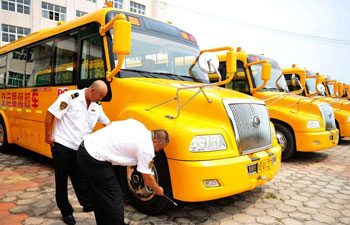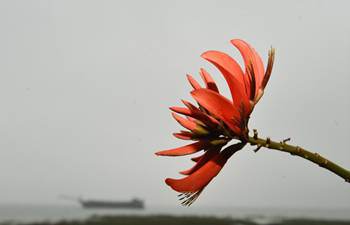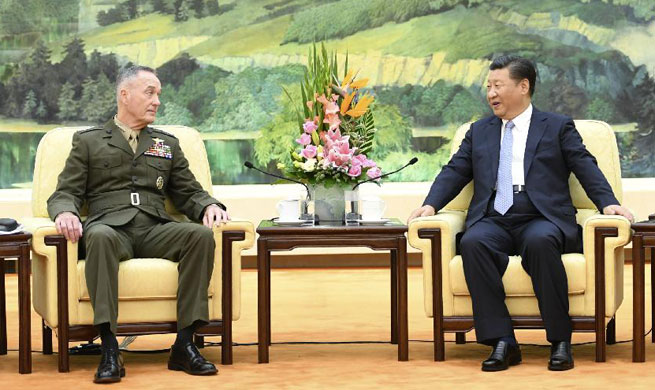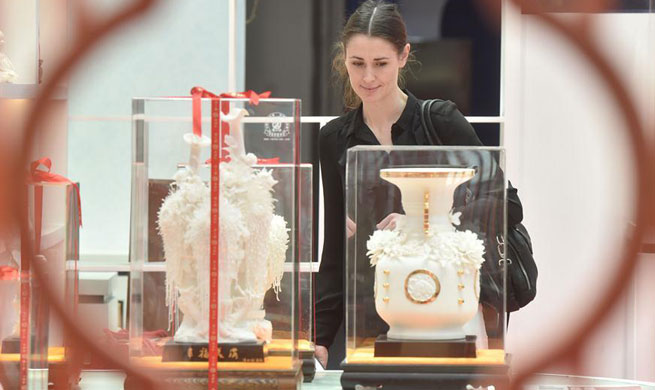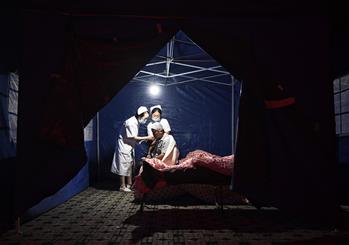NAIROBI, Aug. 17 (Xinhua) -- The decision by Kenya's opposition leader, Raila Odinga to challenge the presidential election outcomes in the Supreme Court instead of resorting to mass action has earned him accolades from the public and foreign allies.
Odinga in his eagerly awaited announcement on his next political move on Wednesday said his NASA coalition will lay bare gross electoral malpractices that unfairly benefitted his rival President Uhuru Kenyatta who won the race.
The 72-year-old veteran opposition leader who was making his fourth stab at the presidency made a tactical retreat from an earlier opposition to seeking legal redress to the election dispute in the Supreme Court, which had opened a floodgate of speculations and anxieties in the country.
Odinga was however emphatic that civil disobedience was not off the table despite his party's decision to file a case in the Supreme Court to challenge Kenyatta's victory.
He also took a swipe at foreign observer missions who gave the just concluded elections a clean bill of health and castigated the State's attempt to gag rights groups that had earlier expressed interest in challenging the presidential election outcomes in the courts of law.
"By going to court, we are not legitimizing misplaced calls by some observers for us to concede but are seeking to give to those who braved long lines in the morning chill and hot afternoon a chance to be heard," said Odinga.
"We are also acting on behalf of those who have been blocked from seeking redress in courts such as the clampdown on civil society that have attempted to go to court. NASA wants to show the world what transpired in the fraud," he added.
Legal experts who spoke after Odinga disclosed his intentions to challenge presidential election outcomes in the Supreme Court said the success of his case hinged on presenting credible and watertight evidence to the panel of seven judges.
Kamotho Waiganjo, a Nairobi-based legal analyst noted that Odinga had made a strategic move by agreeing to file his case on disputed election outcomes at the Supreme Court but it was imperative to arm himself with tight evidence.
"The legal option that Odinga and his NASA Co-Principals settled for is sound and a welcome respite to post-poll anxieties. However, he must present authentic documents illustrating how the results were manipulated," said Waiganjo.
He added that the heaviest responsibility lay with Supreme Court judges whom the Kenyan public and foreign allies expected to deliver an impartial ruling to quell post-election jitters.
During the televised address, Odinga was adamant that his victory was stolen through a well orchestrated plot by his political nemesis who gained access to the electoral agency's servers and manipulated results in favor of the incumbent.
He vowed to present water tight evidence in the Supreme Court to illustrate the depth of manipulation and fraud that denied him victory.
"From the start, the Independent Electoral and Boundaries Commission (IEBC) was illegally releasing unverified results to create the expectation of an Uhuru Kenyatta victory," said Odinga.
"Then there was the bizarre phenomenon of Kenyatta's "lead" staying at around a consistent 11 percent throughout the release of the results! Such a fixed margin has never been maintained throughout any democratic election anywhere in the world," he added.
He condemned what he termed as premature declaration of Kenyatta's win in the absence of supporting documents.
"At midnight last Friday, we saw the IEBC announce that Kenyatta had been elected president, even though the Commission continued to acknowledge that only about 29,000 of the 41,000 verified Forms 34As had been tallied!" Odinga quipped.
U.S. Ambassador to Kenya Robert Godec welcomed the move by Odinga to pursue legal mechanism in challenging Kenyatta's victory.
"We welcome the decision by Kenya's opposition alliance, NASA, to go to the Supreme Court with its concerns regarding the results of the presidential poll. The Supreme Court is the constitutional venue to address disputes," Godec said.
"We look forward to the court resolving the questions NASA has raised in accordance with the rule of law and in the light of the evidence," he added.
Odinga who unsuccessfully contested an election in 2013, sparking violent post-election protests, curtailed potential violence by taking his case to court.
Judges eventually ruled in 2013 that much of his evidence was being submitted outside time limits set by the court, frustrating his supporters and sparking suspicion over the judiciary's independence.
However, he vowed on Wednesday to soldier on with his quest for a fair, just and democratic society even as he sought legal redress to electoral malpractices that denied his victory on August 8 when Kenyans cast the ballot in large numbers.
"We have the right and indeed the high responsibility to defend the Constitution and the people's will. Peaceful assembly is guaranteed by the Constitution, so is civil disobedience. So is the right for labor to strike," said Odinga.
He at the same time expressed skepticism on the ability of the Supreme Court to deliver a fair ruling given the history of meddling by the Executive Branch of the government.
"Our decision to go to court constitutes a second chance for the Supreme Court. The Court can use this chance to redeem itself, or, like in 2013 when we filed a petition, it can compound the problems we face as a country," Odinga added.




